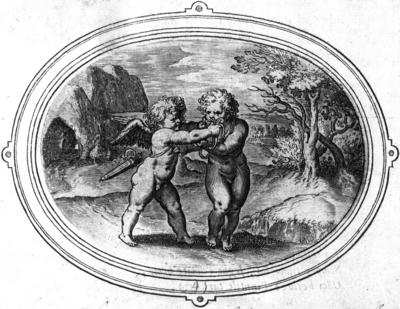Sæpe obstinatis induit frenos amor [45]

Translations
 |
Seneca, Phaedra 574
Vaak beteugelt liefde verstokte harten. |
 |
Seneca, Phaedra 574
Often Love puts curb on stubborn hearts. |
Literature
- Sebastiàn, Lectura crítica
 , p. 29
, p. 29
Sources and parallels
-
Same metaphor used in: Captis oculis, capitur bellua. [10] (in: Jacob Cats, Sinne- en minnebeelden (1627))
[Compare
![Compare [compare]](/static/images/compare2.gif) ]
]
References, across this site, to this page:
- Captis oculis, capitur bellua. [10] (in: Jacob Cats, Sinne- en minnebeelden (1627))
Iconclass
One cupid putting a bridle on another- rocks
[25H112]

- gripping someone by the head (+ variant)
[31A2544(+0)]

- pushing something
[31A2748]

- quiver
[45C23]

- bit
[46C131612]

- reins
[46C131613]

- Obstinacy; 'Ostinatione', 'Pertinacia' (Ripa) (+ emblematical representation of concept)
[53A211(+4)]

- Authority, Power; 'Dominio', 'Giurisdittione' (Ripa) (+ emblematical representation of concept)
[53C11(+4)]

- (personifications and symbolic representations of) Love; 'Amore (secondo Seneca)' (Ripa) (+ emblematical representation of
concept)
[56F2(+4)]

- proverbs, sayings, etc. (with TEXT)
[86(SAEPE OBSTINATIS INDUIT FRENOS AMOR)]

- Cupid struggling with or tormenting other persons, abstract concepts, (fabulous) animals, etc.
[92D142]

- attributes of Cupid (with NAME)
[92D18(QUIVER)]

![[H O M E : Emblem Project Utrecht]](/static/images/rd-small.gif)


















































































































































